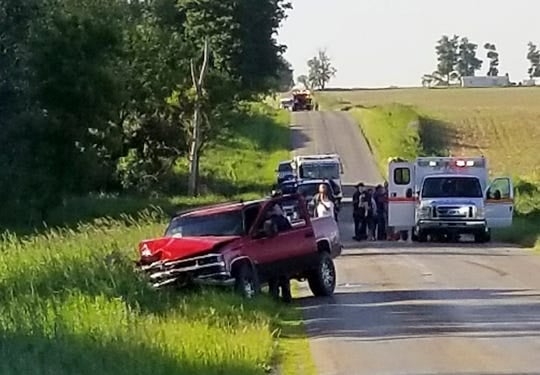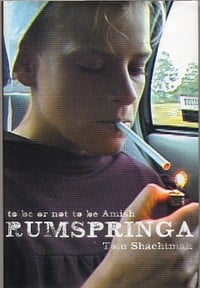New from Donald Kraybill: Renegade Amish
It’s been nearly 18 months since Sam Mullet was sentenced to 15 years in prison for his role in the beard-cutting attacks carried out on Amish in Ohio in late 2011.
Others in Mullet’s group, including those who actually did the cutting, got sentences ranging from one to seven years.
In his upcoming book Renegade Amish: Beard Cutting, Hate Crimes, and the Trial of the Bergholz Barbers, Donald Kraybill tells the story of the incidents and their aftermath.
Here’s the book trailer, in which Kraybill discusses the attacks and the complicated court case which followed:
Looks like the most recent news we’ve had concerning this case dates to late March, on Sam Mullet’s appeal arguing against the federal hate crimes conviction.
We’ll be hearing more from Donald Kraybill as we approach the release date for Renegade Amish (mid-September), and I expect we’ll be having a giveaway as well.
If you have anything you’d like to ask the author, let us know in the comments, and you might see your question answered in the upcoming Q-and-A.





A sad case
This is an informative trailer and I am sure that the book will be fantastic; everything by Donald Kraybill that I have read is fantastic. I certainly will want to read his work; surely it will be educational.
That said; I am not sure why some crimes are labelled as “hate crimes” anyway. If someone assaults someone else is it more damaging to the person assaulted if they are a member of a certain cultural, religious or ethnic group than if they are not? How about if they are murdered? Are they any less dead if they are NOT a member of a “protected” group, but instead are “just” a member of the mainstream population?
Is their own life, limb and property of less value to some people than it would be to others? I fear that as we pursue this well-meaning yet ill-advised policy that people that are wronged, but are not protected by hate crime laws will be delegated to second class citizenship. The “Oh, we don’t have to worry about prosecuting his attackers, because he doesn’t qualify as a protected minority” mindset could easily prevail and if it does justice is cheapened for all.
Regardless, my concerns shouldn’t be taken as a lack of respect for Donald Kraybill and his newest effort. It is sure to be a real page turner …
It became a hate crime when Mullet’s group only targeted men with beards who were Amish. Had they targeted any man with a beard, then it would not have been a hate crime.
A hate crime exists when a person of a minority group is targeted for being a member of that minority group, had they not been, they would not have been a target.
One does not have to be born into a minority group in order for a hate crime to occur. For example, if a criminal only targeted professional football players as his victims, that in theory could be labeled a hate crime.
A hate crime can also occur if one is attacked for being a member of a majority group, as the Sam Mullet case demonstrated. His group was a minority group attacking a majority group, the Mullet’s versus the Old Order.
Labeling a crime a hate crime allows for stricter sentencing, as Sam Mullet found out. So not to worry about only hate crimes being pursued in the future, a crime remains a crime, its the sentencing which differs.
What is a "hate crime" legally
I thought some legal clarification might be helpful: From the FBI website (fbi.gov): “A hate crime is a traditional offense like murder, arson, or vandalism with an added element of bias. For the purposes of collecting statistics, Congress has defined a hate crime as a ‘criminal offense against a person or property motivated in whole or in part by an offender’s bias against a race, religion, disability, ethnic origin or sexual orientation.’ Hate itself is not a crime—and the FBI is mindful of protecting freedom of speech and other civil liberties.” (By the way, this would not, therefore, apply to hatred of groups like football players.)
I find this effort at nuance by the FBI particularly interesting, because it addresses a concern I have had ever since the concept of higher sentences for such crimes became law: To punish a crime more severely (in some cases far more severely) because it is motivated by a particular opinion is in a sense punishing the opinion itself, even though the punishment is not “triggered” unless there is at least some punishment due for a violent action. Essentially, it criminalizes certain beliefs. However much I may “hate” those beliefs, I am concerned about the idea of increasing punishments on people for holding them. If we are going to increase sentences based on motive, I would rather see more severe sentences for cold, rational financial motives than for “honest” hatred.
The thought behind crime
Thanks for sharing that Trish. The final line of that explanation seems specifically pointed at the criticisms of hate crimes law, and makes me wonder if it has always been in there.
Your final line made me think of how premeditated crimes are generally punished more severely than crimes of passion. Maybe what you are suggesting is something similar.
I see your point
Trish
I didn’t reveal all of my thoughts on this subject in my first post. Your clarification triggered a couple of things that I was thinking, but did not include.
As follows: 1) I have a family member that is an attorney in a certain state Attorney General’s office. She said that there is a “priority” placed; be they financial resources, dedicated personnel, etc. on prosecuting “hate crimes”. So by definition if you have X amount of (finite) resources of whatever nature available and you spend a higher percentage of those resources on a certain case or on certain cases; then by default you are spending less on other cases. Simple matter of economic reality. Personally if someone murders another person, or burns their house down I see no difference if the act was motivated by hatred for that person, or if the perpetrator just felt like being vicious. The person that was wronged is still wronged to the same extent regardless. I don’t buy the concept that federal hate crimes laws allow for stricter sentencing, which will act as a deterrent to future similar crimes. It turns out that it doesn’t really matter how long the sentence is … it really comes down to how long a percentage of the sentence the perp serves. There seems to no correlation between a sentence received and time actually served in most cases, so color me skeptical.
2) My second point exactly mirrors your whole second paragraph so there is no value in rehashing that. However, I will add that I am additionally concerned about the federal government, particularly certain federal agencies, being involved in this process. As we have seen recently with the ongoing IRS scandal and any number of other federal “controversies” for that matter there seems to be no limits on the use of federal agencies to advance certain agendas. I am not wild about the prospect of the federal government, regardless of which party happens to be in power, using its weight and power against private citizens that may have a viewpoint that differs from those held by the powers that be. This ‘hate crime” concept looks like a perfect opportunity for extreme partisans of whatever political stripe to use the law to attack their enemies.
Call me paranoid of our government if you wish, I just happen to think that the actions of several federal agencies have proven that they are not entirely trustworthy when it comes to dispensing blind justice. Maybe it is a genetic thing; my ancestors came from much of the same region that the Amish people did and they seem to have a healthy degree of suspicion about government, too.
Real crime
This whole notion of long sentences for cutting off a beard is utterly and disgustingly ridiculous.
How about thenotionof punishing REAL CRIMES that do GRAVE HARM, not this kind of pathetic bs???
Let us begin by ounishing these AMISH who are so damnably abusive tothe dogstney breed.
Nce the AMISH accept full responsibility for their cold blooded abuse of dogs then,and only then,will I even consider tneir beard issue.
A stnkng beard cutting???????
Get real.
Grow up.
I hadn’t yet heard of this book, so will look forward to reading it. Kraybill’s writings usually give me new insight.
Looking forward to the book.
This should be a very interesting book to read
How would Don Kraybill define Amish?
How did the Bergholz community differ from that definition?
Does the term “Amish” need copyright protection? Can that even be done?
What, if anything, can be done to prevent someone like Sam Mullet from hijacking another Amish community?
What can be done – either inside or outside Amish communities – to help restore the Amish image? Is time alone all that is required?
Thank you.
Bergholz and Amish identity
This article with comments from DBK, if you haven’t seen it already, I think addresses your first two questions: http://www.mennoworld.org/archived/2013/2/18/expert-beard-cutters-not-amish/
Your other questions are thought provoking. On the last one I would ask in response if it’s really been damaged. I think this was generally portrayed as a group which went off the reservation even though a lot of media didn’t explore the question of how “Amish” they actually were, beyond the visible similarities.
There is a difference between being perceived as being quirky but benign and being seen as malevolent and conniving. In particular, if Amish are viewed a merely another cult in religion mad America, then the faith has lost it savor (Matthew 5:13, Luke 14:34).
Too Close for Comfort to the Ku Klux Klan
Looking at Mullet’s barbering without a license from a law enforcement or prosecutorial point of view, Mullet’s disciplining after dark is consistent with more notorious organizations such as the Ku Klux Klan. They, too, often prefer(red) to operate under a cloak of darkness.
Unfortunately for Mullet, in this case, he passed the “Duck Test.” (James Whitcomb Riley famously observed: “If it looks like a duck, swims like a duck, and quacks like a duck, then it probably is a duck.”) Behaving like a Grand Wizard, Mullet got treated like a Grand Wizard.
Conversely, had Mullet chosen to trim supposed offenders’ beards at high noon on the proverbial courthouse square, the legal sanctions sought might have been less strident.
It is also possible that Mullet’s behavior fell under the shadow of questionable behavior exhibited in the Amish Mafia television series. Some of Mullet’s more questionable behavior was also consistent with that of Vernon Howell, aka David Koresh, of Branch Davidian infamy and misfortune. While guilt by association is unfortunate, it nevertheless happens in most criminal justice systems.
At first, when I saw the title of this post, I thought it was going to be about the DIY show, Amish RENOgades!
Bergholz Barbers fits together nicely!
Jail sentence too severe
Fifteen years for cutting someone’s beard, something that can grow back, is excessive. I understand there is quite a bit of emotion involved in these cases, but I would think that the man on whom the attack was perpetrated would agree that the punishment is excessive.
Was there an insider?
I’m friends with someone very close to/involved in this case. An Amish fellow. I’ve known him long before the incident in 2011. While we were talking last year he said that there were several authors wanting him to tell the Sam Mullet story for a book and last fall he was headed to NYC to talk with some pretty famous people about a movie.
Sam Mullets Son is a previous owner of the farm we bought in 2012. I’ve written 2 books about our experience in buying the farm. (Sams Son sold it to another Amish, who sold it to us)
It was our lesson that even within the Amish, there are bad people. In our case, the bad seeds were the Bishop (who has since moved to another state) and his son-in-law (Who already lived in another state). “Amish Above the Law” 1 & 2 Available on Amazon.
Anyway, the person mentioned above suggested I be in the running to do the book about the Mullet case. He wasn’t sure who “he would pick” I declined, thanking him (Being a writer isn’t who I want to be. I’m a painter) I can’t wait to ask him if he had a hand in this book when I see him next month! I know some of the stuff that happened out there in Ohio that wasn’t in the papers and by all accounts this book should knock everyones socks off.
I can’t wait to read it!!
Looking forward to the book too.. I too heard loads of stuff about the Mullet case that made cutting beards off look like child play.
As with every group, there are always a few who get a little bit twisted off into the deep end.
Im curious as to how many of the Mullet followers are still “loyal” to Sam Mullet and if there was a major shake up within his own community.
Personally, I dont think 15 years sentence is too long at all.. he led the rest to acting in an illegal way… Kinda like Charles Manson without the murder.. Sick is still sick… no matter to what degree.
The story behind the story?
As already mentioned a couple of times here I also have heard allusions to things that didn’t come out in the trial and also some details, though what is rumor and what is truth is probably hard to discern.
What made the biggest impression on me while the trial/sentencing was going on was the reaction of Amish people–everyone I heard from seemed to feel that Mullet should be dealt with harshly.
It seemed quite uncharacteristic of Amish to suggest things like he should receive a *life sentence*, as some Amish letter writers did pre-sentencing–see: https://amishamerica.com/some-amish-want-life-sentence-for-sam-mullet/
That suggested to me the level of fear of Mullet among Amish, and that there may be more than what we were reading in the papers driving that.
Should be getting an advance copy of this soon and looking forward to it.
So many thought-provoking points here, by author Kraybill and AA followers. I look forward to reading the book, and since it will be out during my birthday month, it will be the first item on my “wish list.”
Unfortunately, I’m afraid it’ll open up another hornet’s nest of misunderstanding of the Amish and their culture, once the media get wind of it…again.
Alice Mary
Hate Crimes-sentences
It seems to me the reason the punishments/sentences are more severe for these labeled ‘hate crimes’ is because of the potential in spreading-and ‘influence’. Kind of like the KKK mentioned and the Charles Manson cult. The severity of the punishment I believe is to send the strong message and example to warn people not to start these kinds of groups. Someone acting on their own has a whole different mindset/motive normally and not influential like we see in this case. Just speculating why the severity of punishment. I have no problem with the 15 years-more of a problem, of what happens when the 15 years are up.
Don Kraybill is Giving a Talk about his new book
If you are anywhere near Eastern Lancaster County, PA on Wednesday, October 22, 2014, Don Kraybill will be talking about his new book, answering your questions and signing the new book (which will be offered for sale). He will also discuss why the hate crimes were overturned by an appeals court in August and will explain what the next steps will be in the legal process as well as answer questions about it.
The proceeds from this dinner and talk will benefit the Nicholas Stoltzfus Homestead in Wyomissing, PA. Nicholas is believed to be the immigrant ancestor for any Amish or non-Amish person with the last name of Stoltzfus in America. It is reported that over 98% of the Amish in Lancaster County have Stoltzfus ancestors. The Homestead is one of the original structures in Berks County that goes back to the 1700’s when the Amish first settled in Berks County. The house was set to be demolished in 1997; it was saved & remodeled in 2003. We are currently finishing a barn to be used for a caretaker’s and Heritage Room/Museum. Learn more about us at http://www.nicholasstoltzfus.com
Don Kraybill will appear at the Shady Maple Banquet Hall in East Earl, PA on Wednesday, October 22nd at 6:30PM. There will be a buffet before the talk and a chance to ask questions after the talk……Come hear the latest on this case and buy an autographed copy of his book!
Tickets are $35.00/person. Please make your check payable to NSHPC and mail to Vivian Beiler, Treasurer, 243 W. Fulton Street, New Holland, PA 17557 or call 443-907-2636 for reservations.